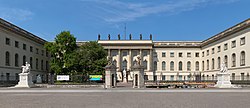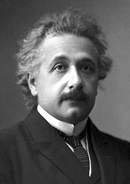Universities and research institutions in Berlin
Universities and research institutions in Berlin
The Berlin-Brandenburg capital region is one of the most prolific centers of higher education and research in the world.[1] It is the largest concentration of universities and colleges in Germany. The city has four public research universities and 27 private, professional and technical colleges (Hochschulen), offering a wide range of disciplines.[2] Access to the German university system is tuition free.
175,000 students were enrolled in the winter term of 2014/15.[3] Around 20% have an international background. Student figures have grown by 50% in the last 15 years. The Humboldt Universität zu Berlin (HU Berlin) has 34,000 students, the Freie Universität Berlin (Free University of Berlin, FU Berlin) has 34,000 students, and the Technische Universität Berlin (TU Berlin) around 30,000 students. The Universität der Künste (UdK) has about 4,000 students and the Berlin School of Economics and Law has enrollment of about 10,000 students.
40 Nobel Prize winners are affiliated to the Berlin-based universities.
History[edit]
The Prussian Academy of Arts (German: Preußische Akademie der Künste) was an art school set up in Berlin, Brandenburg, in 1694/1696 by prince-elector Frederick III, in personal union Duke Frederick I of Prussia, and later king in Prussia. It had a decisive influence on art and its development in the German-speaking world throughout its existence. It dropped 'Prussian' from its name in 1945 and was finally disbanded in 1955 after the 1954 foundation of two separate academies of art for East Berlin and West Berlin in 1954. Those two separate academies merged in 1993 to form Berlin's present-day Academy of Arts.
The Humboldt University of Berlin is one of Berlin's oldest universities, founded in 1810[4] as the University of Berlin (Universität zu Berlin) by the liberal Prussian educational reformer and linguist Wilhelm von Humboldt, whose university model has strongly influenced other European and Western universities.
Universities[edit]
Public universities[edit]
There are six big internationally renowned research universities in the Berlin-Brandenburg capital region:
- Free University of Berlin (FU Berlin), a German University of Excellence (Berlin University Alliance)
- Humboldt University of Berlin (HU Berlin), a German University of Excellence (Berlin University Alliance)
- The Charité is a medical school, one of the largest university hospitals in Europe and a German University of Excellence (Berlin University Alliance)
- Technical University of Berlin (TU Berlin), a German University of Excellence (Berlin University Alliance)
- Berlin University of the Arts (UdK) is the largest art and design school in Europe
- University of Potsdam is situated in the south western part of the Berlin urban region
Private universities[edit]
There are six recognized private universities in Berlin:
- ESCP Europe Wirtschaftshochschule Berlin
- Hertie School of Governance
- Steinbeis-Hochschule Berlin
- ESMT European School of Management and Technology
- International Psychoanalytic University Berlin
Universities of applied sciences[edit]
Berlin has several public or private universities of applied sciences (Hochschulen für angewandte Wissenschaften)
- Alice Salomon Hochschule Berlin (public)
- Bard College Berlin
- Berlin International University of Applied Sciences
- Berlin School of Economics and Law (public)
- Berufsakademie Berlin [1]
- Berlin University of Applied Sciences and Technology (public)
- CODE University of Applied Sciences
- design akademie berlin, SRH Hochschule für Kommunikation und Design [2]
- German Academy for Film and Television Berlin
- Evangelische Fachhochschule [3]
- Hochschule für Technik und Wirtschaft Berlin (public)
- Fachhochschule für Verwaltung und Rechtspflege Berlin
- Hochschule für Musik Hanns Eisler (public)
- Hochschule für Schauspielkunst „Ernst Busch" (public)
- International Business School
- Katholische Fachhochschule [4]
- Katholische Hochschule für Sozialwesen Berlin [5]
- Weißensee Academy of Art Berlin (public)
- Mediadesign Hochschule [6]
- OTA private University of applied sciences Berlin (OTA Hochschule Berlin)
- Teikyo University, Berlin campus
- Touro College Berlin
Research institutions[edit]
Berlin has a high density of research institutions, such as the Fraunhofer Society, the Leibniz Association, the Helmholtz Association, and the Max Planck Society, which are independent of, or only loosely connected to its universities. A total number of around 65,000 scientists are working in research and development in 2012. The city is one of the centers of knowledge and innovation communities (Future Information and Communication Society and Climate Change Mitigation and Adaptation) of the European Institute of Innovation and Technology (EIT).[5]
- Berlin-Brandenburgische Akademie der Wissenschaften
- Biologische Bundesanstalt für Land- und Forstwirtschaft
- Bundesanstalt für Materialforschung und -prüfung (BAM)
- Bundesinstitut für Risikobewertung
- Telekom Innovation Laboratories (affiliated with TU Berlin)
- German Archaeological Institute (DAI)
- Deutsches Bibliotheksinstitut
- Deutsches Herzzentrum Berlin
- Deutsches Institut für Urbanistik
- Ecologic gGmbH [7]
- Fachinformationszentrum Chemie [8]
- Institute for Cultural Inquiry
- Institute of Electronic Business
- Zuse Institute Berlin (ZIB)
- Otto Suhr Institute for Political Science (OSI) of the Freie Universität Berlin
- Physikalisch-Technische Bundesanstalt (PTB)
- Robert Koch Institute (RKI)
- Socio-Economic Panel (SOEP)
- Umweltbundesamt
- Wissenschaftskolleg zu Berlin - Institute for Advanced Study, Berlin [9]
- Wissenschaftszentrum Berlin für Sozialforschung
- Wissenschafts- und Wirtschaftsstandort Adlershof
- Institut für Museumskunde
- Institut für Ökologische Wirtschaftsforschung gGmbH [10]
- Institute for Media and Communication Policy
Leibniz Institutes[edit]

- Leibniz Sozietät
- Deutsches Institut für Internationale Pädagogische Forschung (DIPF)
- German Institute for Economic Research - Deutsches Institut für Wirtschaftsforschung (DIW)
- Deutsches Rheumaforschungszentrum Berlin (DRFZ)
- Leibniz-Institut für Sozialwissenschaften (GESIS)
- Leibniz-Institut für Analytische Wissenschaften – ISAS – e.V.
- Natural History Museum, Berlin (MfN)
- WZB Berlin Social Science Center
Under Forschungsverbund Berlin e. V. (FVB) (Research Association of Berlin):
- Ferdinand-Braun-Institut für Höchstfrequenztechnik [11]
- Leibniz-Institut für Molekulare Pharmakologie (FMP) [12]
- Leibniz-Institut für Gewässerökologie und Binnenfischerei (IGB) [13]
- Leibniz-Institut für Kristallzüchtung [14]
- Institut für Zoo- und Wildtierforschung [15]
- Max-Born-Institut für Nichtlineare Optik und Kurzzeitspektroskopie (MBI) [16]
- Paul-Drude-Institut für Festkörperelektronik, Leibniz-Institut (PDI) [17]
- Weierstraß-Institut für Angewandte Analysis und Stochastik (WIAS) [18]
Helmholtz centers[edit]
- Max Delbrück Center for Molecular Medicine
- Helmholtz-Zentrum Berlin (BESSY)
- Institut für Planetenforschung of the Deutsches Zentrum für Luft- und Raumfahrt [19]
Max-Planck Institutes[edit]
- Fritz Haber Institute of the MPG (FHI)
- Max Planck Institute for Human Development
- Max Planck Institute for Infection Biology
- Max Planck Institute for Molecular Genetics (MOLGEN)
- Max Planck Institute for the History of Science
- Archiv zur Geschichte der Max-Planck-Gesellschaft
Fraunhofer Institutes[edit]
- Fraunhofer-Institut für Nachrichtentechnik
- Heinrich-Hertz-Institut (HHI) [20]
- Sino-German Mobile Communications Institute
- Fraunhofer-Institut für offene Kommunikationssysteme (FOKUS) [21]
- Fraunhofer-Institut für Produktionsanlagen und Konstruktionstechnik (IPK) [22]
- Fraunhofer-Institut für Rechnerarchitektur und Softwaretechnik (integrated into FOKUS in 2012) [23]
- Fraunhofer-Institut für Software- und Systemtechnik (integrated into FOKUS in 2012) [24]
- Fraunhofer-Institut für Zuverlässigkeit und Mikrointegration (IZM) [25]
Nobel Prize winners[edit]
There are 43 Nobel laureates affiliated to the Berlin-based Universities:
|
|
See also[edit]
References[edit]
- ^ "Best universities in Germany 2017". THE. Retrieved 22 September 2016.
- ^ "Metropolis of Sciences". Berlin Partner GmbH. Archived from the original on 24 April 2008. Retrieved 19 August 2008.
- ^ "HochschulenBerlin mit neuem Studentenrekord". Focus (in German). 25 November 2015. Retrieved 1 December 2015.
- ^ "International Higher Education : Countries and rEgions". Ejournals.bc.edu. Retrieved 28 August 2016.
- ^ "European Institute of Innovation and Technology: Home". Europa (web portal). Retrieved 8 June 2010.











Comments
Post a Comment